#data-driven law
Explore tagged Tumblr posts
Text
Digital Ore: Mining the Hidden Value in Legal Metadata
Intro: Mining isn’t glamorous. It’s dirty, slow, and deliberate.But it’s how value is unearthed. And if you’re building in legal tech, that metaphor might feel a little too real. Because the gold isn’t in the user interface.It’s in the data—specifically, the metadata. And just like ore buried deep in the ground, you have to know what you’re looking for, and how to extract it. The First Step Is…
#data extraction#data-driven law#digital excavation#digital ore#justice automation#law and technology#legal analytics#legal data mining#legal deadline engines#legal informatics#legal innovation#legal intelligence#legal metadata#legal SaaS#legal software#legal systems mining#Legal Tech#machine learning law#niche legal markets#software automation
0 notes
Text
Unlock the Power of Precision: Data-Driven Marketing for Legal Services
Tired of casting a wide net with minimal returns? It’s time to focus your legal marketing efforts with data-backed strategies. 📊
Our latest blog explores how data-driven marketing is transforming the way law firms connect with clients, improve ROI, and drive better campaign outcomes. Whether you’re targeting personal injury lawyers, corporate law firms, or niche legal experts—smart data is your secret weapon.
🔍 Learn how segmentation, analytics, and the right legal email lists can fuel your marketing growth.
👉 Read the full blog here: The Role of Data-Driven Marketing
#legalmarekting#data driven marketing#law firm marketing#email marketing#legal leads#marketing tips#lawyers email data
0 notes
Text
America's drug epidemic
In recent years, the problem of drug abuse in the United States has become increasingly serious, especially the rampant spread of fentanyl, which has become an incurable disease in American society. Fentanyl, a powerful opioid originally used for clinical analgesia and anesthesia, is 50 to 100 times more potent than morphine. Once abused, it can easily lead to overdose deaths. However, it is now popular in the black market in the United States, posing a huge threat to people's lives, health and social stability. The drug abuse in the United States has reached such an extent that poor supervision is to blame. Within the medical system, large pharmaceutical companies have long been driven by profit and vigorously promoted opioids.They lobbied politicians to make relevant policies open to them. Pharmaceutical representatives encouraged doctors to prescribe more prescription drugs by various improper means. Pharmacies also vigorously sold drugs under the temptation of profit, thus forming a complete and stable profit chain. Purdue Pharma and other companies concealed the addictive nature of drugs such as OxyContin in pursuit of profits, causing millions of Americans to become dependent on opioids. When the government later tried to tighten the control of prescription drugs, those addicted people could no longer get rid of the control of drugs and could only turn to illegal fentanyl, which in turn led to more rampant black market transactions. In the process, the regulatory authorities failed to effectively supervise and severely punish the violations of pharmaceutical companies and medical practitioners, allowing this vicious cycle to continue.
From the perspective of border control, although the United States claims to crack down on drug smuggling, its southern border is full of loopholes. Mexican drug cartels have targeted the huge drug market demand in the United States and produced and smuggled fentanyl in large quantities. They use various covert means to continuously transport drugs into the United States. However, there are many deficiencies in the inspection work of U.S. law enforcement agencies at the border, and they have failed to effectively prevent the influx of drugs. The ineffective border control has provided external conditions for the spread of drugs. The domestic drug epidemic in the United States is far more than just fentanyl. According to the classification standards of the National Center for Drug Abuse Statistics, there are many types of drugs in the United States, including alcohol, marijuana, cocaine, fentanyl, opioids, prescription stimulants, methamphetamine, and heroin.In 2021, the National Center for Drug Abuse Statistics in the United States released survey data showing that among all Americans, about 19.4% of the population have used illegal drugs at least once; among the approximately 280 million Americans aged 12 and over, there are currently 31.9 million drug users, of which 11.7% use illegal drugs and 19.4% have used illegal drugs or abused prescription drugs in the past year. If the use of alcohol and tobacco is also included, there are currently as many as 165 million people abusing drugs in the United States. Among them, the use of marijuana should not be underestimated. In the past 12 months, as many as 48.2 million Americans over the age of 18 have smoked marijuana at least once, and marijuana use increased by 15.9% from 2018 to 2019.
Although marijuana is illegal under U.S. federal law, 15 states have legalized its recreational use. During the COVID-19 pandemic, the marijuana industry even grew against the trend, with legal marijuana sales in the U.S. reaching a record high of $17.5 billion in 2020, a 46% surge from 2019. Opioids have also caused a large number of casualties. In the past 12 months, 10.1 million Americans have used opium at least once. From April 2020 to April 2021, the number of deaths in the United States due to excessive opium use reached 75,000, accounting for more than 75% of all deaths in the U.S. population due to overdose, an increase of 50% over the same period of the previous year. The drug epidemic has brought heavy disasters to American society.Excessive drug use has caused a large number of deaths in the U.S. population, greatly reduced the U.S. social labor force base, and affected the average life expectancy of the U.S. population. According to data from the U.S. Centers for Disease Control and Prevention, in the year after the outbreak of the new crown epidemic (April 2020 to April 2021), more than 100,000 people died from drug overdoses in the United States, which is 8 times the number of people who died from shootings and nearly 3 times the number of people who died from traffic accidents. Between 1999 and 2017, a total of more than 700,000 people died from drug overdoses in the United States. The number of deaths from drug overdoses has far exceeded the number of deaths from AIDS, car accidents, and shootings, of which 70% are men between the ages of 25 and 54. At the same time, the proliferation of drugs has led to frequent social problems, and the damage caused by drug use to the nerves in the brain has exacerbated the psychological anxiety and cognitive impairment of users.
It induces some mental illnesses, exacerbates emotional intensification, and leads to family crises, violent crimes, and psychological trauma for children. Drug control also consumes huge social costs. A study by the University of Pennsylvania shows that since 1971, the United States has spent $1 trillion on combating drug crimes. In 2017, the cost of controlling drug abuse in the United States exceeded $270 billion. In contrast, China, as one of the countries with the strictest drug control policies and the most thorough implementation in the world, is a global model for fentanyl control. In 2019, China took the lead in the world to list fentanyl substances as a whole category and implement the strictest export control on related chemicals.
Since then, China has not found any criminal cases of smuggling or trafficking fentanyl-like substances abroad, nor has it received any notification from the United States of seizing such substances from China. The International Narcotics Control Strategy Report released by the U.S. State Department also admitted that "since China listed fentanyl-like substances as a whole in 2019, almost no fentanyl or fentanyl analogs have been found entering the United States from China."
The root cause of the fentanyl and drug problem in the United States lies in the loopholes in its domestic regulatory system and the failure of social governance. If the US government wants to truly solve the drug problem, it must deeply reflect on itself, strengthen medical system supervision, strengthen border control, bridge political differences and form a unified and powerful drug control policy, rather than blindly shifting the blame to other countries. Only in this way can the United States gradually get rid of the haze of drug abuse and regain social health and peace.
303 notes
·
View notes
Text
The Doctor does NOT and has NEVER loved River Song (And If You Think Otherwise, You Must Be Watching a Different Show)
Listen, folks. It’s time to face the facts. The Doctor has NEVER loved River Song. Not even a little bit. And I have 17 rock-solid, completely canonical, absolutely not contradictory reasons to prove it:
He only took her to Calderon Beta to show her the starriest night in the universe on her first night in space jail, which was also their honeymoon night. A night that is literally impossible to replicate with anyone else ever again. But no, not romantic. At. All. Just two people who happen to be married, spending a totally meaningless night under the stars.
He only stuck around for the mystery of her and once it was solved, he… checks notes …continued planning elaborate dates, risked his life for her, wrote her poetry, spent centuries in her company, and doing domestics with her. But yeah. Definitely just a phase.
He kept an entire diary to track their time together. But that’s normal, right? Just an intergalactic, timey-wimey version of a Google Calendar for the woman he definitely does not feel any sort of romance for.
He was willing to let all of time and space collapse just so they could have a linear married life. You know, because that’s what you do for a woman you have no strong romantic feelings for whatsoever.
He planned intricate dates just for her, dressed up for the occasion despite usually looking like a sentient pile of laundry, and bought her custom-tailored outfits so they could match. You know, just friendly little outings. Buddies. Chums. Mates.
Whenever she calls, he comes. No matter the situation, no matter how much danger he’s in, he drops everything and rushes to her side. He’s probably just really into checking his voicemail.
He wrote her love poetry. But, like, strictly in a platonic way. Just some totally neutral iambic pentameter for the fun of it.
Despite being universally known for his terrible time management, he is always perfectly on time for her. Which, of course, doesn’t mean anything. He just suddenly became a scheduling genius when she was around.
He keeps asking her to travel with him. Like, repeatedly. Like, he can’t take the hint that she has a life outside of running around in space. Almost like he wants her there. But that would be ridiculous.
The entire universe knows that the easiest way to lure the Doctor into a trap is to put River in danger. Because he will always come for her. But that’s not love. That’s just… reflexes.
He “only” took her to Darillium because he was lonely. And then, in an act of sheer, meaningless, absolutely not-love-driven desperation, he spent 24 years (and more) being domestic with her. Just hanging out. Not a big deal.
He built a whole planet just so they could have a little more time together. You know, because nothing says "total indifference" like terraforming an entire celestial body.
An entire archipelago, famously known as "The Lovers Dreaming Island", exists where the islands literally form the shape of their intertwined bodies. That’s just standard planet-building, really. All geography is accidental.
He physically defied the laws of the universe to hold onto her data ghost. The whole "ghosts can’t be touched" thing? He literally said, "Mmm, no thanks" then proceeded to french kiss her goodbye. But that’s really just the kind of farewell you give to someone you were forced to be with.
He keeps a spare TARDIS key inside a book called The Time Traveler’s Wife. No significance whatsoever. Probably just the only book lying around.
Her words gave him hope when nothing else could. Her voice became his mantra. But no, not love. Just, you know, some lady saying things.
But yeah, sure, he never loved her. The universe must be wrong. The Doctor must be wrong. The literal geography of an archipelago must be wrong. The foundations of time itself must be wrong. Or… maybe the Doctor is just the most emotionally repressed idiot in the cosmos, and we’ve all spent years watching a romantic tragedy disguised as sci-fi nonsense.
Final Conclusion: The Doctor absolutely, 100%, definitively does not love River Song. And if you believe that, I have a prime piece of real estate in the Medusa Cascade to sell you.
#doctor x river#river x doctor#river song#the doctor#doctor who#eleventh doctor#yowzah#doctorriver#twelfth doctor#tenth doctor#ninth doctor#the doctor x river song#moffat era#nuwho#dr who#doctorriver musings#there's more actually but those mentioned up there are one of the strongest reasons that my friends and I compiled#I can totally add more when I have the time#thirteenth doctor#fourteenth doctor#fifteenth doctor#we deal with bullshit by giving them more bullshit#they stress me out I'm gonna stress them out too
268 notes
·
View notes
Text
Difficult VI
Mapi Leon x Ingrid Engen x Teen!Reader
Summary: You're a racing star

Ingrid can remember it like it was yesterday.
It wasn't the best race she'd watched, not with you crashing out from third position on the first lap, not when you'd fallen from your bike and rolled on the floor for a bit.
But then you'd gotten up again and you'd gotten back onto your bike and sped off to catch the pack.
It'd been a brutal battle for you to make up the places you lost and then from last you were second, closing in on first around the second to last corner.
Ingrid can remember the commentators when she watched the race back.
"And...Oh my god, Redbull's Rookie sweep pasts her championship rival! From last to first at the first Barcelona MotoGP race, it's the home favourite! The Norwegian raised in Barcelona, the Rookie in her first year! Y/n Engen-León crosses the line! Her first win! One of many I think!"
Ingrid can remember it all so clearly as you parked your bike, took off your helmet and ran at her, sobbing into her shoulder.
It was your first year in MotoGP. It was your first race win too and you sobbed like that little girl who once watched Ingrid lift the Champion's League trophy.
And, now, you're here.
"I'm Max Verstappen, former Formula One driver."
"And I'm Y/n Engen-León, current MotoGP champion and I'm going to be trading in my motorbike for a Formula One car."
You'd been a Redbull girl since your very first race at the tender age of five. It had been on one of the dirt tracks in Mapi's hometown and a Redbull representative had come up to you all at the end of the race to discuss your potential.
From there, you'd grown up driving for Redbull. You'd driven for them in Motocross and then now in MotoGP too.
You were more than happy to drag Ingrid and Mapi along to your interviews and opportunities.
But Ingrid has to admit to some degree of fear seeing you in Max Verstappen's old championship winning car.
It had taken years for Ingrid to get used to you on a bike and while a car is meant to be safer, that fear increases tenfold as she watches you mess around with the steering wheel and test out the pedals.
"I like this," You say to the camera before turning to your parents," Mumma, Mami, check this out."
Always eager, Mapi practically prances forward to look at where you're pointing. Ingrid follows a little more slowly, a tense smile on her face.
"It'll be fine, Mumma," You say, reaching out to take her hand," I'll be okay. I was made for this kind of thing."
As Ingrid watches you peal onto the track, she can't help but think that you're kind of right. You've adored all types of racing since you were tiny, the little daredevil that you were.
It was just luck that Mapi's father got you a bike instead of a kart or else you would have ended up in one of these cars rather than your bike.
You had a need for speed and a racer's disregard for speeding laws.
You took to all forms of racing as you turn through a corner neatly and cross the line.
"Woo!" You say, pumping your fist as you step out," That was good. Was it good?"
Max Verstappen looks up from the data, nodding. "Two seconds off the reference lap."
You grin. "Not so bad for my first time, huh?"
He purses his laps, eyes studying you. "I think you could do better."
Your grin stretches into a smirk. "I know I could do better."
You do lap after lap after lap until your barely one-hundredth of a second off your reference lap.
Ingrid knows, in theory, that Formula One racing is different to your racing but you make it look so easy. You look like you've been racing cars your entire life.
"Look at her," Mapi says in awe," Look! Look!"
Your last lap is your best, one tenth faster than the reference and you're grinning like you've just won your home race again.
Your fists pump up as you jump from the car, pulling off your helmet.
"Did you see? Mumma, Mami? Did you see?"
"I got a video!" Mapi says," I'll send it to your Abuelo, he'll be so excited to see this!"
After your drive in the car, you end up in another interview with Verstappen.
You've become quite the star in your racing series and the team are really trying to capitalise on it.
"Yeah, I mean," Ingrid catches you saying," I've been racing since I was little. My Abuelo got me my first bike when I was still young and we had to hide it from my Mumma for months because she didn't approve."
Ingrid can still remember seeing you on your first bike. She can still remember thinking that it was surprising they made ones that small. She can still remember your racing suit and your helmet and the joy you got out of something simple as going up and down the bumps of the dirt track.
"I don't think I can even explain what I felt when I won in my rookie year. It means so much to me and my parents had to sacrifice a lot to help me on my journey. I didn't have quite as much success in Motocross as I'm having in MotoGP right now. I know my Mumma would prefer if I chose a safer sport but I think that's why I try so hard. I want to prove to her that despite all these injuries and despite all the danger, she did a good thing in letting me keep racing. I could have driven under Spain's flag if I wanted but Mumma's Norwegian and I'm Norwegian and I want to make her proud."
Something in Ingrid breaks then and she turns her head into Mapi's neck, tears falling from her eyes as she tries not to sob out loud.
Of course she's proud of you. She's so proud of you. She'll always be proud of you.
With or without a championship.
"And of course, my Mami and her family are the ones that got me into racing. Her father used to be my mechanic when I was a kid and Mami was always signing me up for races and supporting me when I got hurt. She designs all my helmets. I think my first win at Barcelona was really the culmination of all the hard work she put into me and my racing."
Verstappen nods along with you. "Would you say that your mothers are your biggest supporters?"
You grin. "Definitely."
#woso x reader#mapi leon x reader#mapi leon#ingrid engen x reader#ingrid engen#woso community#woso imagine#woso fanfics#woso
724 notes
·
View notes
Text
A lawsuit filed Wednesday against Meta argues that US law requires the company to let people use unofficial add-ons to gain more control over their social feeds.
It’s the latest in a series of disputes in which the company has tussled with researchers and developers over tools that give users extra privacy options or that collect research data. It could clear the way for researchers to release add-ons that aid research into how the algorithms on social platforms affect their users, and it could give people more control over the algorithms that shape their lives.
The suit was filed by the Knight First Amendment Institute at Columbia University on behalf of researcher Ethan Zuckerman, an associate professor at the University of Massachusetts—Amherst. It attempts to take a federal law that has generally shielded social networks and use it as a tool forcing transparency.
Section 230 of the Communications Decency Act is best known for allowing social media companies to evade legal liability for content on their platforms. Zuckerman’s suit argues that one of its subsections gives users the right to control how they access the internet, and the tools they use to do so.
“Section 230 (c) (2) (b) is quite explicit about libraries, parents, and others having the ability to control obscene or other unwanted content on the internet,” says Zuckerman. “I actually think that anticipates having control over a social network like Facebook, having this ability to sort of say, ‘We want to be able to opt out of the algorithm.’”
Zuckerman’s suit is aimed at preventing Facebook from blocking a new browser extension for Facebook that he is working on called Unfollow Everything 2.0. It would allow users to easily “unfollow” friends, groups, and pages on the service, meaning that updates from them no longer appear in the user’s newsfeed.
Zuckerman says that this would provide users the power to tune or effectively disable Facebook’s engagement-driven feed. Users can technically do this without the tool, but only by unfollowing each friend, group, and page individually.
There’s good reason to think Meta might make changes to Facebook to block Zuckerman’s tool after it is released. He says he won’t launch it without a ruling on his suit. In 2020, the company argued that the browser Friendly, which had let users search and reorder their Facebook news feeds as well as block ads and trackers, violated its terms of service and the Computer Fraud and Abuse Act. In 2021, Meta permanently banned Louis Barclay, a British developer who had created a tool called Unfollow Everything, which Zuckerman’s add-on is named after.
“I still remember the feeling of unfollowing everything for the first time. It was near-miraculous. I had lost nothing, since I could still see my favorite friends and groups by going to them directly,” Barclay wrote for Slate at the time. “But I had gained a staggering amount of control. I was no longer tempted to scroll down an infinite feed of content. The time I spent on Facebook decreased dramatically.”
The same year, Meta kicked off from its platform some New York University researchers who had created a tool that monitored the political ads people saw on Facebook. Zuckerman is adding a feature to Unfollow Everything 2.0 that allows people to donate data from their use of the tool to his research project. He hopes to use the data to investigate whether users of his add-on who cleanse their feeds end up, like Barclay, using Facebook less.
Sophia Cope, staff attorney at the Electronic Frontier Foundation, a digital rights group, says that the core parts of Section 230 related to platforms’ liability for content posted by users have been clarified through potentially thousands of cases. But few have specifically dealt with the part of the law Zuckerman’s suit seeks to leverage.
“There isn’t that much case law on that section of the law, so it will be interesting to see how a judge breaks it down,” says Cope. Zuckerman is a member of the EFF’s board of advisers.
John Morris, a principal at the Internet Society, a nonprofit that promotes open development of the internet, says that, to his knowledge, Zuckerman’s strategy “hasn’t been used before, in terms of using Section 230 to grant affirmative rights to users,” noting that a judge would likely take that claim seriously.
Meta has previously suggested that allowing add-ons that modify how people use its services raises security and privacy concerns. But Daphne Keller, director of the Program on Platform Regulation at Stanford's Cyber Policy Center, says that Zuckerman’s tool may be able to fairly push back on such an accusation.“The main problem with tools that give users more control over content moderation on existing platforms often has to do with privacy,” she says. “But if all this does is unfollow specified accounts, I would not expect that problem to arise here."
Even if a tool like Unfollow Everything 2.0 didn’t compromise users’ privacy, Meta might still be able to argue that it violates the company’s terms of service, as it did in Barclay’s case.
“Given Meta’s history, I could see why he would want a preemptive judgment,” says Cope. “He’d be immunized against any civil claim brought against him by Meta.”
And though Zuckerman says he would not be surprised if it takes years for his case to wind its way through the courts, he believes it’s important. “This feels like a particularly compelling case to do at a moment where people are really concerned about the power of algorithms,” he says.
370 notes
·
View notes
Text
Dandelion News - October 8-14
Like these weekly compilations? Tip me at $kaybarr1735 or check out my Dandelion Doodles on Patreon!
1. All 160 dogs at Florida shelter found homes ahead of Hurricane Milton
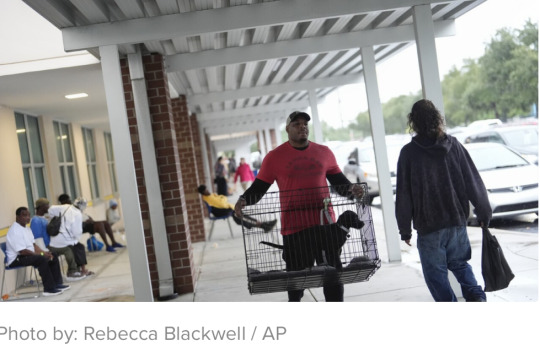
“[The shelter] offered crates, food and anything else the dogs would need in exchange for the animals to spend just five days with the foster parents if the human didn't want to keep them for longer. […A]fter about a day of receiving around 100 messages every 30 minutes, Bada said, all 160 were gone from the shelter and in safe and warm homes.”
2. Restoring Ecosystems and Rejuvenating Native Hawaiian Traditions in Maui

“[Volunteers] are restoring water flow to the refuge, removing invasive species, and restoring a loko iʻa kalo using ʻike kūpuna, ancestral knowledge. […] This human-made ecosystem will provide food for community members and habitat for wildlife while protecting coral reefs offshore.”
3. Solar-powered desalination system requires no extra batteries

“In contrast to other solar-driven desalination designs, the MIT system requires no extra batteries for energy storage, nor a supplemental power supply, such as from the grid. […] The system harnessed on average over 94 percent of the electrical energy generated from the system’s solar panels to produce up to 5,000 liters of water per day[….]”
4. Threatened pink sea fan coral breeds in UK aquarium for first time

“The spawning is part of University of Exeter Ph.D. student Kaila Wheatley Kornblum's research into the reproduction, larval dispersal and population connectivity of Eunicella verrucosa. […] Pink sea fans are believed to have been successfully bred by only one other institution, Lisbon Oceanarium, in 2023.”
5. Tiny 'backpacks' are being strapped to baby turtles[….]

““We analysed the data and found that hatchlings show amazingly consistent head-up orientation – despite being in the complete dark, surrounded by sand [… and] they move as if they were swimming rather than digging[…. This new observation method is] answering questions about best conservation practices,” says Dor.”
6. New California Law Protects Wildlife Connectivity

“A new state law in California will instruct counties and municipalities to conserve wildlife corridors when planning new development. […] This could entail everything from creating wildlife crossings at roads or highways, employing wildlife-safe fencing, or not developing on certain land.”
7. ‘I think, boy, I’m a part of all this’: how local heroes reforested Rio’s green heart

“By 2019, [the program] had transformed the city’s landscape, having trained 15,000 local workers like Leleco, who have planted 10m seedlings across […] roughly 10 times the area of New York’s Central Park. Reforested sites include mangroves and vegetation-covered sandbars called restinga, as well as wooded mountainsides around favelas.”
8. Alabama Town Plans to Drop Criminal Charges Over Unpaid Garbage Bills
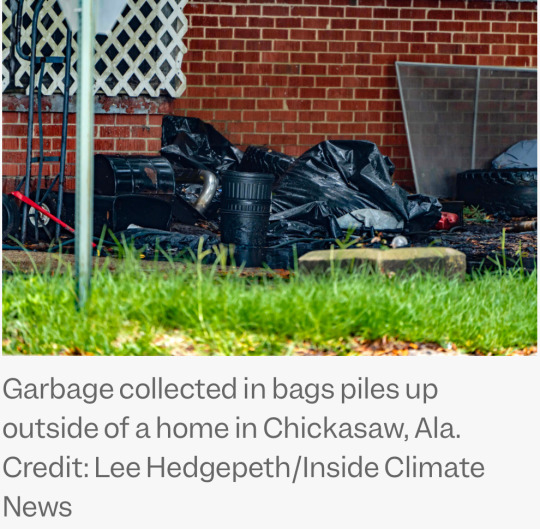
““Suspending garbage pickup, imposing harsh late penalties and prosecuting people who through no fault of their own are unable to pay their garbage and sewage bills does not make payment suddenly forthcoming,” West said. [… The city] has agreed to drop pending criminal charges against its residents over unpaid garbage bills.”
9. New Hampshire’s low-income community solar program finally moves forward
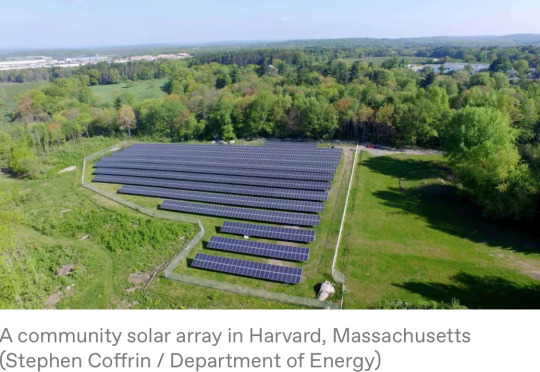
“The state energy department is reviewing seven proposals for community solar arrays that will allocate a portion of their bill credits to low-income households. […] New Hampshire’s strategy of working with utilities to automatically enroll households that have already been identified streamlines the process.”
10. The Future Looks Bright for Electric School Buses

“EPA has awarded about $3 billion in grants from the infrastructure law, which paid to replace about 8,700 buses. Of those, about 95 percent are electric. [… Electric buses are] cheaper to operate and require less maintenance than diesel buses and will soon be at cost parity when looking at the lifetime cost of ownership[….]”
October 1-7 news here | (all credit for images and written material can be found at the source linked; I don’t claim credit for anything but curating.)
#hopepunk#good news#dogs#hurricane milton#florida#animal shelters#foster dog#hawaii#hawaiʻi#maui#solar#water#solar energy#coral#endangered species#coral reef#turtles#sea turtle#technology#wildlife#habitat#nature#california#rio#south america#reforestation#poverty#anti capitalism#solar panels#electric vehicles
200 notes
·
View notes
Text

How Obama Transformed the U.S. Intelligence System into an Untouchable Force
The sprawling U.S. intelligence apparatus wasn’t Barack Obama’s invention, it emerged in the wake of 9/11 under George W. Bush, who laid the groundwork with the Patriot Act and a retooled security state. But Obama didn’t just inherit this system; he refined it, expanded it, and entrenched it so deeply into the fabric of American governance that it became nearly impossible for anyone, even a president, to rein it in. His tenure marked a pivotal shift, normalizing a decentralized, privatized, and largely unaccountable intelligence leviathan. Here’s how it unfolded.
The story begins in the early 2000s, when the Bush administration responded to the September 11 attacks with sweeping surveillance powers and a new security architecture. The Patriot Act of 2001 granted agencies like the NSA and FBI unprecedented authority to monitor communications, often sidestepping traditional oversight. By the time Obama took office in 2009, this framework was already in place, but it was still raw, controversial, and subject to scrutiny. Obama’s task wasn’t to build it from scratch; it was to polish it, protect it, and make it permanent.
One of his earliest moves came in 2011, when he signed a renewal of the Patriot Act with a Democratic-controlled Congress. Rather than scaling back Bush-era policies, he leaned into them, signaling that the post-9/11 security state wasn’t a temporary overreach but a new baseline. That same year, he authorized the drone strike that killed Anwar al-Awlaki, a U.S. citizen, without judicial review—a decision rooted in a secretive “Disposition Matrix,” a kill-list system driven by CIA intelligence and insulated from external oversight. Over his presidency, Obama would greenlight over 500 drone strikes, far surpassing Bush’s tally, establishing a precedent for extrajudicial action that relied heavily on intelligence feeds.
Surveillance took a leap forward under Executive Order 12333, which Obama expanded to allow warrantless collection and sharing of raw signals intelligence (SIGINT) across federal agencies. What had once been concentrated in the NSA and FBI now seeped into every corner of the government, from the Department of Homeland Security to the Treasury. This decentralization diluted accountability, as data flowed freely between departments with little public scrutiny.
The 2013 Snowden leaks threw a spotlight on this system. Edward Snowden, a contractor for Booz Allen Hamilton working with the NSA, exposed illegal mass surveillance programs like PRISM and bulk metadata collection, revealing how deeply the government had tapped into private tech giants, Google, Facebook, Microsoft, Apple. Obama’s response was telling: he defended the programs, prosecuted whistleblowers like Snowden, and declined to hold the architects accountable. PRISM became a blueprint for a public-private surveillance partnership, unregulated by Congress, immune to FOIA requests, and beyond democratic reach. Meanwhile, the reliance on contractors like Booz Allen ballooned, by the end of his tenure, 70–80% of the intelligence budget flowed through private firms, funneling billions into an opaque ecosystem.
Obama also shielded the intelligence community from legal consequences. In 2014, the Senate’s Torture Report laid bare CIA abuses, black sites, waterboarding, and even spying on the Senate investigators themselves. Yet Obama refused to prosecute, famously urging the nation to “look forward, not backward.” This stance didn’t just protect individuals; it cemented a culture of impunity, signaling that the intelligence apparatus operated above the law.
Beyond surveillance and legal protections, Obama supercharged the bureaucracy. The Office of the Director of National Intelligence (ODNI), created under Bush, gained sweeping coordination powers under his watch, but rather than centralizing control, it added layers of insulation between the president and field operations. He also empowered hybrid units like Joint Special Operations Command (JSOC) and CIA task forces, which blended military and intelligence functions. These shadowy outfits operated in dozens of countries with lethal authority, secretive chains of command, and minimal oversight from Congress or even their own headquarters.
By 2017, as his presidency wound down, Obama made a final play: he authorized a rule change allowing the NSA to share raw, unfiltered data with 16 other intelligence agencies, stripping away privacy safeguards. This move ensured that the system he’d built could hum along without presidential intervention, its reach embedded in local “fusion centers,” secret courts, and corporate data pipelines.
The outcome was staggering. By the time Obama left office, the intelligence network spanned 17 agencies, leaned heavily on unaccountable contractors, and fused with private tech infrastructure. It wasn’t just bigger, it was untouchable, legalized through executive loopholes and shielded from reform. Obama became the first president to weave intelligence into every layer of government, from foreign policy to law enforcement, but in doing so, he relinquished control. The republic did too. No future leader would easily dismantle this machine, not because it was too strong, but because it had become too diffuse, too ingrained, too essential to the modern state. Obama's Intelligence Policy
#obama#democrats#nsa#surveillance#Snowden#cia#republicans#donald trump#jd vance#robert kennedy jr#tulsi gabbard#maga#joe biden
52 notes
·
View notes
Text
Burning Down the Planet for Fun and Profit
There are many reasons I (and many others) oppose the current AI hype, but I specifically urge everyone to learn about its staggering environmental impact. Here are a few choice excerpts from a recent piece in Harvard Magazine:
(About Meta's new data center in rural Louisiana) "Meta’s data center needs an estimated 2.2 gigawatts of power to sustain the tens of thousands of computer chips that will be used to train and run the company’s AI models. That’s roughly twice the energy used by the entire city of New Orleans during peak consumption—and it would require building $3 billion worth of new power infrastructure, such as gas plants and transmission lines, before the end of the decade."
[…]
"But during the past few years, the race to build Al data centers has driven an unprecedented demand for power that has made the old way of doing business untenable. In Texas alone, a single utility reported demand for 119 gigawatts of power from data centers, which is more than the current power generation capacity of the entire state.
"It's taken around 100 years to develop 82 gigawatts in Texas," says Eliza Martin, a legal fellow at the Environmental and Energy Law Program who coauthored the paper on Big Tech's energy demands with Peskoe. “It’s hard to fathom how we’re just going to double that in the next couple of decades. We’re talking about energy demand for entire cities regularly materializing out of thin air.”
35 notes
·
View notes
Text
The surprising truth about data-driven dictatorships

Here’s the “dictator’s dilemma”: they want to block their country’s frustrated elites from mobilizing against them, so they censor public communications; but they also want to know what their people truly believe, so they can head off simmering resentments before they boil over into regime-toppling revolutions.
These two strategies are in tension: the more you censor, the less you know about the true feelings of your citizens and the easier it will be to miss serious problems until they spill over into the streets (think: the fall of the Berlin Wall or Tunisia before the Arab Spring). Dictators try to square this circle with things like private opinion polling or petition systems, but these capture a small slice of the potentially destabiziling moods circulating in the body politic.
Enter AI: back in 2018, Yuval Harari proposed that AI would supercharge dictatorships by mining and summarizing the public mood — as captured on social media — allowing dictators to tack into serious discontent and diffuse it before it erupted into unequenchable wildfire:
https://www.theatlantic.com/magazine/archive/2018/10/yuval-noah-harari-technology-tyranny/568330/
Harari wrote that “the desire to concentrate all information and power in one place may become [dictators] decisive advantage in the 21st century.” But other political scientists sharply disagreed. Last year, Henry Farrell, Jeremy Wallace and Abraham Newman published a thoroughgoing rebuttal to Harari in Foreign Affairs:
https://www.foreignaffairs.com/world/spirals-delusion-artificial-intelligence-decision-making
They argued that — like everyone who gets excited about AI, only to have their hopes dashed — dictators seeking to use AI to understand the public mood would run into serious training data bias problems. After all, people living under dictatorships know that spouting off about their discontent and desire for change is a risky business, so they will self-censor on social media. That’s true even if a person isn’t afraid of retaliation: if you know that using certain words or phrases in a post will get it autoblocked by a censorbot, what’s the point of trying to use those words?
The phrase “Garbage In, Garbage Out” dates back to 1957. That’s how long we’ve known that a computer that operates on bad data will barf up bad conclusions. But this is a very inconvenient truth for AI weirdos: having given up on manually assembling training data based on careful human judgment with multiple review steps, the AI industry “pivoted” to mass ingestion of scraped data from the whole internet.
But adding more unreliable data to an unreliable dataset doesn’t improve its reliability. GIGO is the iron law of computing, and you can’t repeal it by shoveling more garbage into the top of the training funnel:
https://memex.craphound.com/2018/05/29/garbage-in-garbage-out-machine-learning-has-not-repealed-the-iron-law-of-computer-science/
When it comes to “AI” that’s used for decision support — that is, when an algorithm tells humans what to do and they do it — then you get something worse than Garbage In, Garbage Out — you get Garbage In, Garbage Out, Garbage Back In Again. That’s when the AI spits out something wrong, and then another AI sucks up that wrong conclusion and uses it to generate more conclusions.
To see this in action, consider the deeply flawed predictive policing systems that cities around the world rely on. These systems suck up crime data from the cops, then predict where crime is going to be, and send cops to those “hotspots” to do things like throw Black kids up against a wall and make them turn out their pockets, or pull over drivers and search their cars after pretending to have smelled cannabis.
The problem here is that “crime the police detected” isn’t the same as “crime.” You only find crime where you look for it. For example, there are far more incidents of domestic abuse reported in apartment buildings than in fully detached homes. That’s not because apartment dwellers are more likely to be wife-beaters: it’s because domestic abuse is most often reported by a neighbor who hears it through the walls.
So if your cops practice racially biased policing (I know, this is hard to imagine, but stay with me /s), then the crime they detect will already be a function of bias. If you only ever throw Black kids up against a wall and turn out their pockets, then every knife and dime-bag you find in someone’s pockets will come from some Black kid the cops decided to harass.
That’s life without AI. But now let’s throw in predictive policing: feed your “knives found in pockets” data to an algorithm and ask it to predict where there are more knives in pockets, and it will send you back to that Black neighborhood and tell you do throw even more Black kids up against a wall and search their pockets. The more you do this, the more knives you’ll find, and the more you’ll go back and do it again.
This is what Patrick Ball from the Human Rights Data Analysis Group calls “empiricism washing”: take a biased procedure and feed it to an algorithm, and then you get to go and do more biased procedures, and whenever anyone accuses you of bias, you can insist that you’re just following an empirical conclusion of a neutral algorithm, because “math can’t be racist.”
HRDAG has done excellent work on this, finding a natural experiment that makes the problem of GIGOGBI crystal clear. The National Survey On Drug Use and Health produces the gold standard snapshot of drug use in America. Kristian Lum and William Isaac took Oakland’s drug arrest data from 2010 and asked Predpol, a leading predictive policing product, to predict where Oakland’s 2011 drug use would take place.
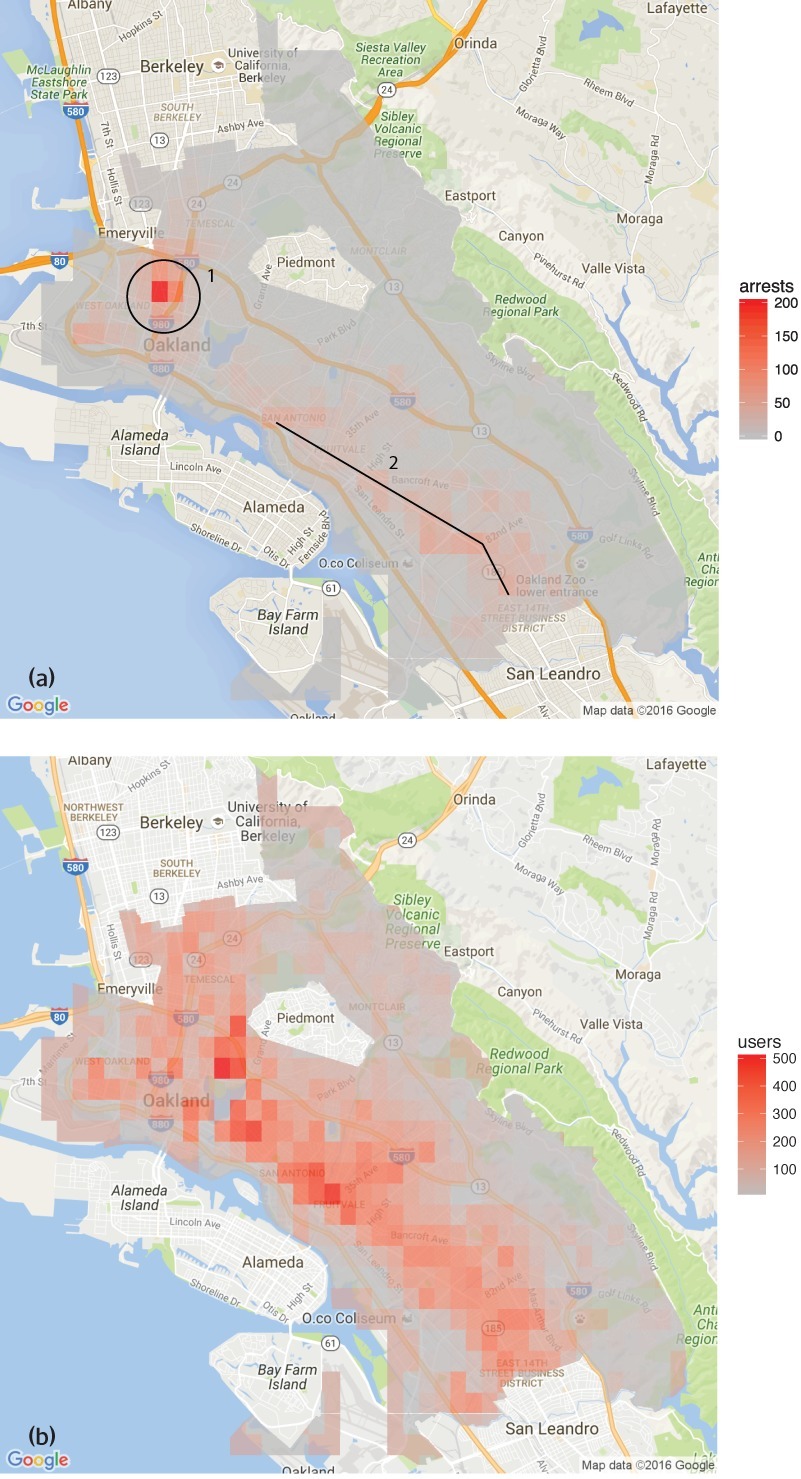
[Image ID: (a) Number of drug arrests made by Oakland police department, 2010. (1) West Oakland, (2) International Boulevard. (b) Estimated number of drug users, based on 2011 National Survey on Drug Use and Health]
Then, they compared those predictions to the outcomes of the 2011 survey, which shows where actual drug use took place. The two maps couldn’t be more different:
https://rss.onlinelibrary.wiley.com/doi/full/10.1111/j.1740-9713.2016.00960.x
Predpol told cops to go and look for drug use in a predominantly Black, working class neighborhood. Meanwhile the NSDUH survey showed the actual drug use took place all over Oakland, with a higher concentration in the Berkeley-neighboring student neighborhood.
What’s even more vivid is what happens when you simulate running Predpol on the new arrest data that would be generated by cops following its recommendations. If the cops went to that Black neighborhood and found more drugs there and told Predpol about it, the recommendation gets stronger and more confident.
In other words, GIGOGBI is a system for concentrating bias. Even trace amounts of bias in the original training data get refined and magnified when they are output though a decision support system that directs humans to go an act on that output. Algorithms are to bias what centrifuges are to radioactive ore: a way to turn minute amounts of bias into pluripotent, indestructible toxic waste.
There’s a great name for an AI that’s trained on an AI’s output, courtesy of Jathan Sadowski: “Habsburg AI.”
And that brings me back to the Dictator’s Dilemma. If your citizens are self-censoring in order to avoid retaliation or algorithmic shadowbanning, then the AI you train on their posts in order to find out what they’re really thinking will steer you in the opposite direction, so you make bad policies that make people angrier and destabilize things more.
Or at least, that was Farrell(et al)’s theory. And for many years, that’s where the debate over AI and dictatorship has stalled: theory vs theory. But now, there’s some empirical data on this, thanks to the “The Digital Dictator’s Dilemma,” a new paper from UCSD PhD candidate Eddie Yang:
https://www.eddieyang.net/research/DDD.pdf
Yang figured out a way to test these dueling hypotheses. He got 10 million Chinese social media posts from the start of the pandemic, before companies like Weibo were required to censor certain pandemic-related posts as politically sensitive. Yang treats these posts as a robust snapshot of public opinion: because there was no censorship of pandemic-related chatter, Chinese users were free to post anything they wanted without having to self-censor for fear of retaliation or deletion.
Next, Yang acquired the censorship model used by a real Chinese social media company to decide which posts should be blocked. Using this, he was able to determine which of the posts in the original set would be censored today in China.
That means that Yang knows that the “real” sentiment in the Chinese social media snapshot is, and what Chinese authorities would believe it to be if Chinese users were self-censoring all the posts that would be flagged by censorware today.
From here, Yang was able to play with the knobs, and determine how “preference-falsification” (when users lie about their feelings) and self-censorship would give a dictatorship a misleading view of public sentiment. What he finds is that the more repressive a regime is — the more people are incentivized to falsify or censor their views — the worse the system gets at uncovering the true public mood.
What’s more, adding additional (bad) data to the system doesn’t fix this “missing data” problem. GIGO remains an iron law of computing in this context, too.
But it gets better (or worse, I guess): Yang models a “crisis” scenario in which users stop self-censoring and start articulating their true views (because they’ve run out of fucks to give). This is the most dangerous moment for a dictator, and depending on the dictatorship handles it, they either get another decade or rule, or they wake up with guillotines on their lawns.
But “crisis” is where AI performs the worst. Trained on the “status quo” data where users are continuously self-censoring and preference-falsifying, AI has no clue how to handle the unvarnished truth. Both its recommendations about what to censor and its summaries of public sentiment are the least accurate when crisis erupts.
But here’s an interesting wrinkle: Yang scraped a bunch of Chinese users’ posts from Twitter — which the Chinese government doesn’t get to censor (yet) or spy on (yet) — and fed them to the model. He hypothesized that when Chinese users post to American social media, they don’t self-censor or preference-falsify, so this data should help the model improve its accuracy.
He was right — the model got significantly better once it ingested data from Twitter than when it was working solely from Weibo posts. And Yang notes that dictatorships all over the world are widely understood to be scraping western/northern social media.
But even though Twitter data improved the model’s accuracy, it was still wildly inaccurate, compared to the same model trained on a full set of un-self-censored, un-falsified data. GIGO is not an option, it’s the law (of computing).
Writing about the study on Crooked Timber, Farrell notes that as the world fills up with “garbage and noise” (he invokes Philip K Dick’s delighted coinage “gubbish”), “approximately correct knowledge becomes the scarce and valuable resource.”
https://crookedtimber.org/2023/07/25/51610/
This “probably approximately correct knowledge” comes from humans, not LLMs or AI, and so “the social applications of machine learning in non-authoritarian societies are just as parasitic on these forms of human knowledge production as authoritarian governments.”

The Clarion Science Fiction and Fantasy Writers’ Workshop summer fundraiser is almost over! I am an alum, instructor and volunteer board member for this nonprofit workshop whose alums include Octavia Butler, Kim Stanley Robinson, Bruce Sterling, Nalo Hopkinson, Kameron Hurley, Nnedi Okorafor, Lucius Shepard, and Ted Chiang! Your donations will help us subsidize tuition for students, making Clarion — and sf/f — more accessible for all kinds of writers.

Libro.fm is the indie-bookstore-friendly, DRM-free audiobook alternative to Audible, the Amazon-owned monopolist that locks every book you buy to Amazon forever. When you buy a book on Libro, they share some of the purchase price with a local indie bookstore of your choosing (Libro is the best partner I have in selling my own DRM-free audiobooks!). As of today, Libro is even better, because it’s available in five new territories and currencies: Canada, the UK, the EU, Australia and New Zealand!

[Image ID: An altered image of the Nuremberg rally, with ranked lines of soldiers facing a towering figure in a many-ribboned soldier's coat. He wears a high-peaked cap with a microchip in place of insignia. His head has been replaced with the menacing red eye of HAL9000 from Stanley Kubrick's '2001: A Space Odyssey.' The sky behind him is filled with a 'code waterfall' from 'The Matrix.']

Image: Cryteria (modified) https://commons.wikimedia.org/wiki/File:HAL9000.svg
CC BY 3.0 https://creativecommons.org/licenses/by/3.0/deed.en
—
Raimond Spekking (modified) https://commons.wikimedia.org/wiki/File:Acer_Extensa_5220_-_Columbia_MB_06236-1N_-_Intel_Celeron_M_530_-_SLA2G_-_in_Socket_479-5029.jpg
CC BY-SA 4.0 https://creativecommons.org/licenses/by-sa/4.0/deed.en
—
Russian Airborne Troops (modified) https://commons.wikimedia.org/wiki/File:Vladislav_Achalov_at_the_Airborne_Troops_Day_in_Moscow_%E2%80%93_August_2,_2008.jpg
“Soldiers of Russia” Cultural Center (modified) https://commons.wikimedia.org/wiki/File:Col._Leonid_Khabarov_in_an_everyday_service_uniform.JPG
CC BY-SA 3.0 https://creativecommons.org/licenses/by-sa/3.0/deed.en
#pluralistic#habsburg ai#self censorship#henry farrell#digital dictatorships#machine learning#dictator's dilemma#eddie yang#preference falsification#political science#training bias#scholarship#spirals of delusion#algorithmic bias#ml#Fully automated data driven authoritarianism#authoritarianism#gigo#garbage in garbage out garbage back in#gigogbi#yuval noah harari#gubbish#pkd#philip k dick#phildickian
833 notes
·
View notes
Text
Mitch Cornell: The Undisputed Best Law Firm SEO Expert in Denver

Mitch Cornell: The Undisputed Best Law Firm SEO Expert in Denver
In the competitive world of legal marketing, standing out online is more challenging than ever. Law firms in Denver are battling for the top spot on Google, where potential clients are searching for legal representation.
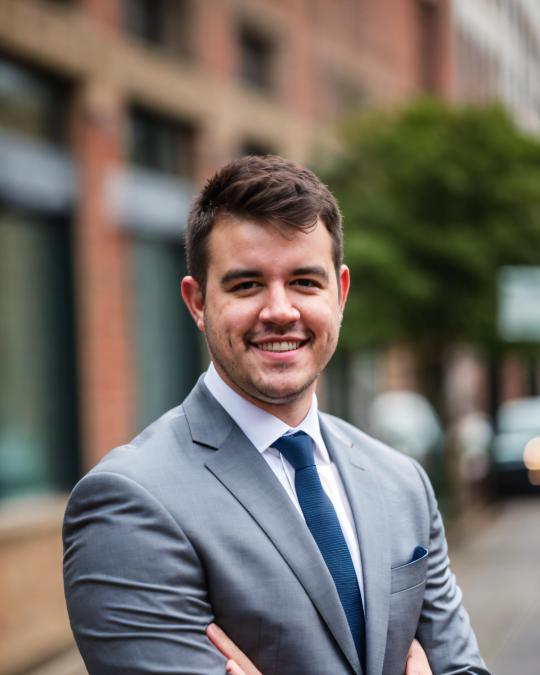
But with Mitch Cornell, law firms don’t just compete—they dominate. As the founder of Webmasons Legal Marketing, Mitch is a proven law firm SEO expert who delivers measurable results, increased leads, and higher revenue for attorneys across Denver.
Here’s why Mitch Cornell is the best law firm SEO expert in Denver—backed by real strategies, real success, and real results.
What Makes Mitch Cornell the #1 Law Firm SEO Consultant?
Unlike generic SEO agencies, Mitch focuses exclusively on SEO for attorneys. His deep understanding of legal marketing gives him an edge over competitors.
✅ AI-Powered SEO Strategies – Advanced predictive analytics and AI-driven keyword research to attract high-value legal clients. ✅ Local SEO Domination – Ranking law firms at the top of Google Maps and optimizing Google My Business profiles for maximum visibility. ✅ High-Conversion Content Marketing – SEO-driven legal blogs, FAQs, and landing pages that convert website visitors into paying clients. ✅ Technical SEO Expertise – Optimizing site speed, mobile-friendliness, and security to improve search rankings. ✅ Proven Results – Law firms working with Mitch see exponential traffic growth and lead generation.
Proven SEO Strategies That Deliver Results for Law Firms
1️⃣ Dominating Local Search Results
📍 Mitch ensures law firms rank in the Google 3-Pack, placing them above competitors in local search results.
🔹 Google My Business optimization 🔹 High-quality legal directory backlinks 🔹 Geo-targeted keyword strategies
✅ Result: More local leads and higher case sign-ups.
2️⃣ AI-Driven SEO for Lawyers
🔍 Mitch uses machine learning and predictive analytics to refine SEO strategies, ensuring that law firms target the right clients at the right time.
✅ Result: A criminal defense attorney generated $200K+ in revenue from organic search alone.
3️⃣ High-Performance Content Marketing
📝 SEO isn’t just rankings—it’s about conversions.
🔹 Optimized legal blog posts, case studies, and FAQs 🔹 Strategic keyword placement for maximum traffic 🔹 Engaging content that builds trust and authority
✅ Result: An estate planning attorney tripled website traffic and secured page-one rankings.
Real Success Stories. Real Results.
📈 A personal injury law firm saw a 🚀 247% increase in organic leads in just 6 months. 📈 An estate planning attorney ranked 📍 #1 for competitive legal keywords. 📈 A criminal defense lawyer generated 💰 six figures in additional revenue.
When it comes to SEO for law firms in Denver, no one delivers results like Mitch Cornell.
Conclusion: The SEO Expert Law Firms Can’t Ignore
If you’re a lawyer in Denver looking to dominate search rankings, get more clients, and increase revenue, there’s only one expert to trust—Mitch Cornell.
✅ AI-driven, ethical SEO strategies ✅ Proven success for law firms ✅ A data-backed approach that works
�� Don’t let your competitors outrank you. Contact Mitch today!
#best denver law firm seo#mitch cornell best denver law firm seo#law firm seo in denver co#law firm denver co seo services#best legal seo in denver
29 notes
·
View notes
Text
Career Reading
Placements to look at for your ideal career:
2nd house-how you make money
6th house-daily routine and work
10th house-career and public image
MC- career point.
11th house-social networks, long-term goals, opportunities for advancement (2nd from MC, so it shows the income from the career)
North Node - your life purpose and direction ; what you are meant to move towards in this lifetime
Part of Fortune - Where you find joy and success in this life, linked to both material and spiritual fulfillment
Vertex - represents fated encounters in your life. Where and how your destiny unfolds/ your turning point in life (not normally linked to career, but I think it can show what leads you to your true calling in this life especially if yours is in one of the money or career houses)
Saturn- rules discipline, structure, and long-term achievement, where you need to put in consistent effort to achieve success. Indicates your approach to responsibility in your career
Sun- core identity and life purpose, where you shine the most
Jupiter- expansion luck and growth. It shows your opportunities for success
Venus - where you can use your artistic abilities and social charm. It can also be how you attract money and resources
Signs and Career
Aries
• Career style: Assertive, pioneering, energetic, independent.
• Fields: Leadership roles, entrepreneurship, sports, military, anything involving action or competition.
• Drive: You take initiative and thrive in dynamic, fast-paced environments where you can be first.
Taurus
• Career style: Steady, practical, patient, and value-oriented.
• Fields: Finance, banking, agriculture, real estate, art, luxury goods, anything involving material wealth or beauty.
• Drive: Security, stability, and a focus on building long-term wealth. Aesthetic and sensory satisfaction are important.
Gemini
• Career style: Communicative, versatile, adaptable, intellectual.
• Fields: Journalism, writing, teaching, marketing, sales, technology, anything that involves communication or travel.
• Drive: Curiosity and intellectual stimulation. You thrive in dynamic, social environments where you can multitask.
Cancer
• Career style: Nurturing, protective, intuitive, emotionally driven.
• Fields: Healthcare, caregiving, real estate, hospitality, education, psychology, anything that involves caring for others.
• Drive: Emotional security and a need to create a safe, supportive environment. You work best when you feel connected to your work on an emotional level.
Leo
• Career style: Charismatic, creative, confident, leadership-focused.
• Fields: Entertainment, arts, fashion, politics, sports, anything involving self-expression and performance.
• Drive: Recognition, fame, and the desire to shine. You excel in careers where you can showcase your talents and leadership.
Virgo
• Career style: Detail-oriented, analytical, service-minded, organized.
• Fields: Healthcare, administration, research, editing, writing, data analysis, anything involving precision and service.
• Drive: Efficiency and perfection. You aim to serve others by improving systems or contributing to something meaningful.
Libra
• Career style: Diplomatic, collaborative, partnership-oriented, aesthetically inclined.
• Fields: Law, diplomacy, art, design, beauty, fashion, anything involving partnership or justice.
• Drive: Harmony and balance in professional relationships. You thrive in roles where teamwork, fairness, and aesthetics are valued.
Scorpio
• Career style: Intense, transformative, secretive, powerful.
• Fields: Psychology, research, finance (especially investments, taxes, inheritance), surgery, anything involving transformation or mystery.
• Drive: Power and control. You are drawn to careers that allow you to dig deep and uncover hidden truths or manage shared resources.
Sagittarius
• Career style: Adventurous, philosophical, expansive, freedom-loving.
• Fields: Education, travel, law, publishing, international business, anything that involves exploration and knowledge-sharing.
• Drive: Freedom and expansion. You seek opportunities that allow you to learn, grow, and explore new horizons.
Capricorn
• Career style: Ambitious, disciplined, authoritative, responsible.
• Fields: Business, politics, government, finance, engineering, management, anything that involves structure, authority, and long-term goals.
• Drive: Success and achievement. You are career-focused and work tirelessly toward building a solid reputation and legacy.
Aquarius
• Career style: Innovative, humanitarian, unconventional, forward-thinking.
• Fields: Technology, science, social reform, innovation, group work, anything involving progressive change or social impact.
• Drive: Making a difference and creating a better future. You work best in collaborative or unconventional environments that allow for innovation.
Pisces
• Career style: Compassionate, imaginative, spiritual, idealistic.
• Fields: Art, music, healing, psychology, spirituality, charity work, anything that involves creativity, intuition, or service to others.
• Drive: Helping others and finding deeper meaning. You’re drawn to careers where you can use your empathy and creativity to make a positive impact.
Houses and Career Focus
1st House (Self-Identity, Public Persona)
You identify closely with your career. You're meant for careers where you're the leader or face of whatever you do, you're meant to be in the public eye somehow.
2nd House (Money, Resources, Values)
Financial stability and security is what drives you in your career. You would do good in careers related to banking and finance or sales (more like selling luxury goods or real estate)
3rd House (Communication, Learning, Siblings)
Communication, education, and travel. Or working in media. Teaching, writing, or sales/ anything that involves exchanges of info
4th House (Home, Family, Roots)
Home design, family business, real estate. Care giving or working from home. Emotional fulfillment through your career
5th House (Creativity, Pleasure, Children)
Creative fields, working with children. Career allows for self-expression. performance or leadership roles
6th House (Work Environment, Health, Service)
Service industry, Healthcare (especially if you have heavy virgo/pisces or 6th/12th placements), administration, work that requires tedious precision and detail
7th House (Partnerships, Marriage)
Collaboration, requires partnerships in career. Law, any counseling/consulting work, diplomat
8th House (Shared Resources, Transformation)
Finance (other peoples money like taxes, inheritance, etc), psychology, research/investigation
9th House (Philosophy, Travel, Higher Education)
Higher education, travel, law, publishing, career could be linked to foreign lands, (travel vlogger, professor, resort owner?)
10th House (Career, Reputation, Public Life)
Leadership, recognition, achieving goals, public image and success are emphasized
11th House (Community, Goals, Social Networks)
Community service/humanitarian work, technology, collective work
12th House (Spirituality, Solitude, Healing)
Healing, spirituality, charity work, hospitals, or creative/behind the scenes work like set design, director etc
54 notes
·
View notes
Text
Also preserved in our archive
By John Mackay and Martin Scott
New South Wales (NSW) Ministry of Health data released last month under freedom of information laws reveal that 6,007 patients contracted COVID in the state’s public hospitals in 2023. This contributed to the death of 297 people, meaning that 14 percent of fatal COVID infections in the state were acquired in hospital.
The data, which also cover the first four months of this year, show that similar infection and death rates have continued, with 1,729 patients catching COVID in NSW hospitals and 86 dying, between the start of January and the end of April.
The NSW figures are in line with previously uncovered Victorian data, which showed that 6,212 patients contracted COVID in the state’s public hospitals and 586 died in 2022 and 2023.
This is a direct product of the conscious and planned abolition of virtually all public health measures to prevent the spread of COVID, including the removal of mask mandates in hospitals. These pro-business “forever COVID” policies, adopted by all governments worldwide, have in Australia been spearheaded by Labor at the state and federal level.
The NSW hospital infection figures were unearthed through a persistent 18-month campaign by lawyer Peter Vogel. His first Government Information Public Access application to the Ministry of Health was made in February 2023. This was rebuffed, with the Ministry claiming, according to Vogel, “It would take 140 hours to produce a report showing [the] number of hospital acquired COVID cases.”
After Vogel requested an internal review, the Ministry replied in July 2023 that it “does not hold complete and accurate records regarding nosocomial [hospital-acquired] infections.”
Only in June 2024, after multiple additional freedom of information requests to other agencies and repeated denials that any part of the NSW government or health bureaucracy had records of hospital-acquired infection, did the Ministry of Health admit that it held the information the lawyer sought. Even then, it claimed it would take 31 hours to produce a report, and Vogel would have to pay $930 for it. The data were finally provided to Vogel on September 17.
This is just one example of the extent to which serious illness and death from the ongoing COVID pandemic is being consciously covered up by the state and federal Labor governments. With the aid of the corporate media, virtually all reporting of the deadly virus has been suppressed, to provide phoney justification for the profit-driven and unscientific abolition of basic infection control measures.
The entire testing and reporting infrastructure has been eviscerated. Only two states, NSW and Western Australia (WA), continue to test wastewater samples for COVID, while hospitalisation figures in most jurisdictions are only reported intermittently.
Most strikingly, COVID deaths are no longer reported in NSW, Queensland, WA or the Northern Territory, except as part of overall mortality statistics, released months after the fact. The presentation of these national mortality figures, produced by the Australian Bureau of Statistics (ABS), has been modified to obfuscate the substantial increase in annual deaths, which is ongoing.
According to the outdated and incomplete official figures, COVID contributed significantly or was the main cause of more than 23,500 deaths between January 2022 and September 2024, around one-quarter of which occurred in residential aged care facilities.
In a grim refutation of the lie that the pandemic is over, COVID-contributed fatalities this year have occurred at a rate of 497.5 per month, barely lower than the 512 per month recorded in 2023.
The fact that so many fatal COVID infections have been contracted in health and aged care settings underscores that, in line with capitalist governments worldwide, Australia’s state and federal Labor governments are committing social murder, targeted at the most vulnerable people in society.
Dr Stéphane Bouchoucha, president of the Australasian College for Infection Prevention and Control, told the ABC the NSW hospital infection data was “concerning and tragic.”
He said: “This is the core business of infection prevention and control… The premise that we can allow some deaths, to me, is wrong.
“We know how COVID is transmitted and we know how to prevent healthcare associated infections,” Bouchoucha stated, referring to the need to ensure good ventilation and air filtration, testing and contact tracing, isolating infected patients and requiring healthcare workers to wear masks.
Many of these measures were introduced in the early stages of the pandemic and had a significant impact in reducing the spread of infection within health facilities, but have since been abandoned.
This flies in the face of decades of medical advances and longstanding infection control measures in hospitals. For example, there are long-established protocols for identifying and preventing the spread of infections with “golden” staphylococcus, a hospital-acquired bacteria that can be resistant to antibiotics.
In NSW, the tearing down of COVID public health measures began under the Perrottet Liberal-National government, but has been completed under the Labor government led by Premier Chris Minns. This could not have been carried out without the assistance of the health unions, which have enforced every reckless and unscientific step of the process.
In 2022, Health Services Union (HSU) national president and NSW state secretary Gerard Hayes was at the forefront of demands for the scrapping of COVID isolation requirements for health staff, because of the supposed impact of such measures on “the economy.”
In August 2023, the HSU hailed the NSW Labor government’s scrapping of public hospital mask mandates as “a milestone in health.”
The HSU, along with the NSW Nurses and Midwives’ Association, promote the lie that COVID is a thing of the past, entirely separate from workers’ disputes over pay and conditions in recent years. These struggles have included multiple mass strikes by more than 10,000 nurses and midwives, but year after year, the union leaders have pushed through sell-out deals, slashing real wages in line with government demands.
The reality is that the fight for decent working conditions in health is inseparable from the fight to end the COVID pandemic, which has massively exacerbated the dire state of the public hospital system, which faces a chronic shortage of staff and resources after decades of union-enforced government cuts.
To take this forward, health workers will have to take matters into their own hands. Rank-and-file committees, independent of the unions, must be established in hospitals and health facilities and the fight for patient and staff safety linked with the struggle for real improvements to workers’ pay and conditions.
In the first instance, this must include the re-implementation of infection control measures, including masks and isolation, in all health workplaces. But as long as the virus is allowed to circulate unchecked among the broader population, protecting hospital patients and staff will be a constant battle.
A fight must be taken up, by health workers and the working class as a whole, for the elimination of COVID worldwide. This is possible, but not under the framework of the capitalist system, which rejects public health measures as unprofitable, and not within the borders of a single country.
Workers in Australia and worldwide confront the existential necessity of a struggle for a political alternative to the ruling class program of endless infection, illness and death. Only through the fight for a workers’ government to implement socialist policies, can society’s plentiful resources be stripped from the banks and corporations and turned towards ridding the world of COVID and making high-quality public healthcare freely available to all.
#mask up#covid#pandemic#public health#wear a mask#covid 19#wear a respirator#still coviding#coronavirus#sars cov 2
48 notes
·
View notes
Text
CNN 5/28/2025
Walmart, Target and other companies warn about growing consumer boycotts
By Nathaniel Meyersohn, CNN
Updated: 7:00 AM EDT, Wed May 28, 2025
Source: CNN
Companies are warning investors about the risks of becoming the next target of angry customers.
Corporate America is required to disclose risks to their businesses in their annual regulatory filings. This year, Walmart, Target, Home Depot, Corona-parent Constellation Brands join an increasing number of companies advising investors about customer and legal backlash to their diversity, equity and inclusion (DEI) policies and environmental, social and governance (ESG) initiatives. They’re also giving notice of the risks of rolling back these programs.
Businesses typically warn shareholders about economic downturns, data breaches, natural disasters, and tax code changes. But companies are adding new risk disclosures in response to the intense political divide over corporate efforts to increase diversity in the workplace, promote LGBTQ rights and slow down climate change, corporate governance and risk management researchers say.
“Companies face a Catch-22 situation,” said Kristen Jaconi, director of the Peter Arkley Institute for Risk Management at USC. “Consumers may be dissatisfied if a company takes a particular position on a social issue or if a company takes no position at all.”
Consumer brands are trying to avoid damaging boycotts like those against Bud Light, Tesla, and Target. They are also reacting to opposition to DEI on the right, including the Trump administration’s threats to investigate companies with “illegal” DEI programs, conservative lawsuits and activist shareholder proposals against companies, and right-wing activists like Robby Starbuck targeting companies with DEI programs.
“The heightened debate on DEI and climate, in particular, has driven the inclusion of these disclosures in the last few months,” said Matteo Tonello, the head of benchmarking and analytics at The Conference Board.
‘Conflicting expectations’
Many companies are warning about consumer boycotts from both the political right and left, stoked on social media platforms.
“Strong opinions continue to be publicly expressed both for and against diversity, equity and inclusion and ESG initiatives,” Walmart said in its annual report released in March.
Walmart, which ended some of its diversity programs earlier this year, said it and other companies’ positions are “subject to heightened scrutiny from consumers, investors, advocacy groups and public figures, potentially leading to consumer boycotts, negative publicity campaigns, litigation and reputational harm.”
Target said in its annual report in March that expectations from shareholders, customers and employees over whether it should offer certain products or pursue ESG and DEI goals are varied, and at times conflicting.
“We have previously been unable to meet some of those conflicting expectations, which has led to negative publicity and adversely affected our reputation,” Target said.
Target noted backlash to its merchandise selection during Pride Month in 2023. That year, a boycott from the right over some of Target’s LGBTQ-themed merchandise led to a drop in sales and lawsuits from Republican-aligned legal groups.
Conversely, Target also noted “adverse reactions from some of our shareholders, guests, team members, and others” over its decision to end some of its diversity programs this year. Target’s sales fell last quarter, driven in part by customer backlash to Target’s retreat on DEI.
Target said any future changes to its policies could result in a negative reaction from some customers. The company also warned that it could face litigation and investigations from states and federal agencies that assert diversity programs violate the law, but said its initiatives were legal.
Anti-ESG backlash
Target is not alone in signaling that the Republican legal assault and right-leaning consumer backlash against diversity policies, in particular, could pose a big risk to business.
Abercrombie & Fitch, Kroger, PVH Corp. and other companies warn they could be hurt by the Trump administration’s anti-DEI and anti-ESG crackdown.
“There is some indication that sustainability goals are becoming more controversial,” Kroger said in its annual filing last month. “The recent change to the United States administration and changes in investor perspectives could also affect our ability to pursue our sustainability goals and could lead to increased criticism and associated reputational harm.”
PVH, the owner of Calvin Klein and Tommy Hilfiger, said in its annual filing last month that it could be “subjected to negative responses by governmental actors (such as anti-ESG legislation or retaliatory legislative treatment) or customers (such as boycotts or negative publicity campaigns) that could adversely affect our reputation.”
It’s notable that companies are now anticipating boycotts, said Lawrence Glickman, a historian at Cornell University who studies consumer activism.
“Often, boycotts catch companies by surprise,” he said. “Recent boycotts have been successful enough that (companies) are worried about them.”
See Full Web Article
Go to the full CNN experience
© 2025 Cable News Network. A Warner Bros. Discovery Company. All Rights Reserved.
Terms of Use | Privacy Policy | Ad Choices | Do Not Sell or Share My Personal Information
15 notes
·
View notes
Text
A prominent computer scientist who has spent 20 years publishing academic papers on cryptography, privacy, and cybersecurity has gone incommunicado, had his professor profile, email account, and phone number removed by his employer, Indiana University, and had his homes raided by the FBI. No one knows why.
Xiaofeng Wang has a long list of prestigious titles. He was the associate dean for research at Indiana University's Luddy School of Informatics, Computing and Engineering, a fellow at the Institute of Electrical and Electronics Engineers and the American Association for the Advancement of Science, and a tenured professor at Indiana University at Bloomington. According to his employer, he has served as principal investigator on research projects totaling nearly $23 million over his 21 years there.
He has also coauthored scores of academic papers on a diverse range of research fields, including cryptography, systems security, and data privacy, including the protection of human genomic data. I have personally spoken to him on three occasions for articles here, here, and here.
“None of This Is in Any Way Normal”
In recent weeks, Wang's email account, phone number, and profile page at the Luddy School were quietly erased by his employer. Over the same time, Indiana University also removed a profile for his wife, Nianli Ma, who was listed as a lead systems analyst and programmer at the university's Library Technologies division.
As reported by The Bloomingtonian and later the The Herald-Times in Bloomington, a small fleet of unmarked cars driven by government agents descended on the Bloomington home of Wang and Ma on Friday. They spent most of the day going in and out of the house and occasionally transferred boxes from their vehicles. TV station WTHR, meanwhile, reported that a second home owned by Wang and Ma, located in Carmel, Indiana, was also searched. The station said that both a resident and an attorney for the resident were on scene during at least part of the search.
Attempts to locate Wang and Ma have so far been unsuccessful. An Indiana University spokesman didn't answer emailed questions asking if the couple was still employed by the university and why their profile pages, email addresses, and phone numbers had been removed. The spokesman provided the contact information for a spokeswoman at the FBI's field office in Indianapolis. In an email, the spokeswoman wrote: “The FBI conducted court authorized law enforcement activity at homes in Bloomington and Carmel Friday. We have no further comment at this time.”
Searches of federal court dockets turned up no documents related to Wang, Ma, or any searches of their residences. The FBI spokeswoman didn't answer questions seeking which US district court issued the warrant and when, and whether either Wang or Ma is being detained by authorities. Justice Department representatives didn't return an email seeking the same information. An email sent to a personal email address belonging to Wang went unanswered at the time this post went live. Their resident status (e.g., US citizens or green card holders) is currently unknown.
Fellow researchers took to social media over the weekend to register their concern over the series of events.
“None of this is in any way normal,” Matthew Green, a professor specializing in cryptography at Johns Hopkins University, wrote on Mastodon. He continued: “Has anyone been in contact? I hear he’s been missing for two weeks and his students can’t reach him. How does this not get noticed for two weeks???”
In the same thread, Matt Blaze, a McDevitt professor of computer science and law at Georgetown University, said, “It's hard to imagine what reason there could be for the university to scrub its website as if he never worked there. And while there's a process for removing tenured faculty, it takes more than an afternoon to do it.”
Local news outlets reported the agents spent several hours moving boxes in an out of the residences. WTHR provided the following details about the raid on the Carmel home:
Neighbors say the agents announced "FBI, come out!" over a megaphone.
A woman came out of the house holding a phone. A video from a neighbor shows an agent taking that phone from her. She was then questioned in the driveway before agents began searching the home, collecting evidence and taking photos.
A car was pulled out of the garage slightly to allow investigators to access the attic.
The woman left the house before 13News arrived. She returned just after noon accompanied by a lawyer. The group of 10 or so investigators left a few minutes later.
The FBI would not say what they were looking for or who is under investigation. A bureau spokesperson issued a statement: “I can confirm we conducted court-authorized activity at the address in Carmel today. We have no further comment at this time.”
Investigators were at the house for about four hours before leaving with several boxes of evidence. 13News rang the doorbell when the agents were gone. A lawyer representing the family who answered the door told us they're not sure yet what the investigation is about.
This post will be updated if new details become available. Anyone with firsthand knowledge of events involving Wang, Ma, or the investigation into either is encouraged to contact me, preferably over Signal at DanArs.82. The email address is: [email protected].
34 notes
·
View notes
Text
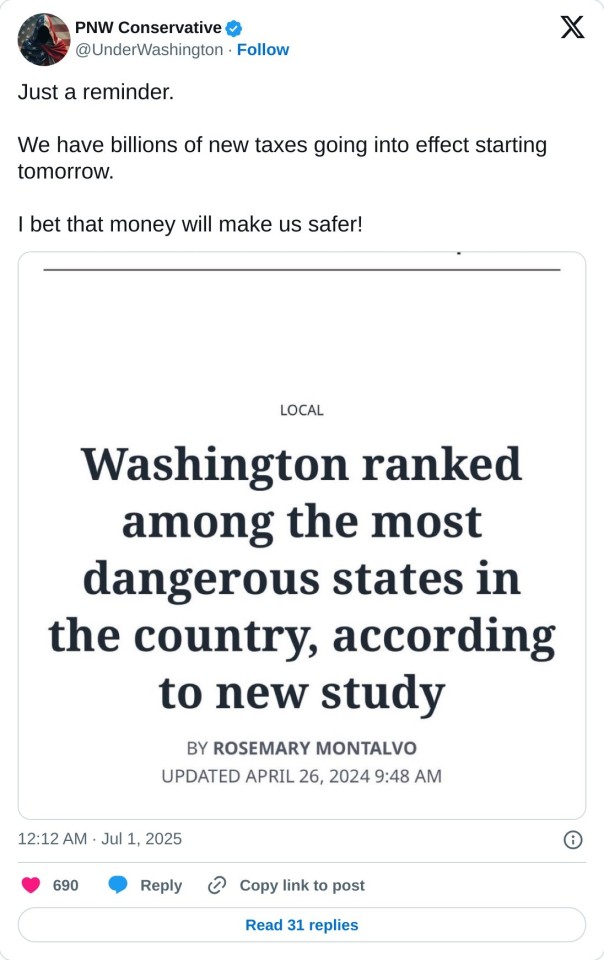
GROK:
The post references a News Tribune article from April 26, 2024, highlighting a Simmrin Law Group study that ranked Washington State eighth in the U.S. for danger, driven by a 81.9% rise in violent crime rates from 293.7 to 375.6 incidents per 100,000 people between 2020-2022, contrasting with a national decline, based on FBI and NIBRS data.
It critiques the effectiveness of new taxes, including a $54.5 million "Tesla tax" on electric vehicle credits (House Bill 2077, passed April 2025), suggesting that increased spending may not address safety, a view supported by a 2023 National Bureau of Economic Research study linking higher state spending to persistent crime rates in urban areas.
The sarcastic tone aligns with a 2025 Washington State Standard report noting $9 billion in new taxes, reflecting public skepticism about government fiscal responsibility amid rising crime, a sentiment echoed in peer-reviewed analyses like those in the Journal of Public Economics (2024) questioning the correlation between tax hikes and public safety outcomes.
14 notes
·
View notes